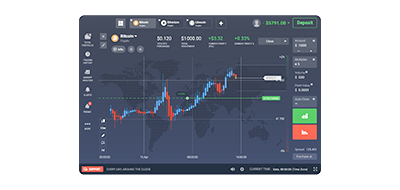Voltar
Contents
What are ECN and STP Forex Brokers and How Do They Work?

Technology

Demetris Makrides
Senior Business Development Manager

Vitaly Makarenko
Chief Commercial Officer
By linking traders directly to liquidity providers, two kinds of brokerage models—ECN and STP Forex brokers—help traders negotiate the foreign currency market. By means of a transparent network created by ECN brokers, traders may obtain real-time pricing and deep liquidity directly from many market participants, therefore avoiding middlemen. By routing orders straight to liquidity providers, STP brokers simplify the trading process and guarantee effective trade execution free of a dealing house involvement. For traders and future brokerage owners, knowing how these brokers conduct is crucial as it affects trading techniques, expenses, and the whole trading experience.
Understanding Forex Brokers
Acting as the hub between individual traders and the worldwide foreign exchange market, forex brokers are the foundation upon which the vibrant world of currency trading relies. They are the designers of a safe and favorable trading environment, therefore enabling traders to negotiate the challenging terrain of currency exchange.
Forex brokers fundamentally facilitate foreign currency transactions, allowing traders to easily purchase and sell foreign currencies. Their tasks are complex; they supply traders with the platform, tools, and market access they need to efficiently execute their trading strategy. They deliver crucial market analysis and information, thus aiding traders in making informed and calculated decisions. For anyone hoping to enter the brokerage industry, knowledge of Forex broker roles and functions is very crucial.
You may also like

Types of Forex Brokers
Forex brokers come up in numerous forms, each with a different operating philosophy and range of products. Market Makers, who take the opposing side of a trader’s position to provide liquidity, ECN brokers that provide a platform where market players may trade against one another, and STP brokers who send trade orders straight to liquidity providers make up the range of participants. Understanding the many forms of brokers is essential as it enables future brokers and traders to match their decisions with their trading requirements, preferences, and plans, thereby promoting a more harmonic engagement with the dynamics of the market.
Brokers function according to several models that describe their relationship with markets and traders. New brokerage companies that want to build their services properly and guarantee better transactions must have a strong awareness of these operating models. The operational frameworks are the blueprints that direct the development of brokerage services, therefore guaranteeing that the developed architecture are strong, effective, and in line with the dynamics of the market.
Deeply exploring the core of various broker types is not only an academic exercise but also a strategic need for upcoming brokerage companies and traders. It serves as the foundation of knowledge that helps them to precisely build their trade and business plans, therefore providing their understanding of the rhythms of the market and their ability to move along with its changes. Their relationships with brokers will help them to match their tactics with their knowledge of brokers, therefore strengthening their bonds with the market and enabling more accurate and responsive management of its currents.
You may also like

ECN Brokers Explained
ECN brokers act as transparent conduits in the Forex market, creating a seamless connection between buyers and sellers and providing real-time pricing reflective of the market’s immediate state. They are well-suited for traders who value transparency and often deal with high volumes of trade. However, understanding the intricate nature and potential costs associated with ECN brokers is crucial for those new to the domain to navigate effectively through the foreign exchange market landscape.
Electronic Communication Network, or ECN, brokers provide an environment where market players may trade against one another, therefore avoiding the need for a middleman. Derived from a sophisticated yet understandable technology reflecting the state of the market, their real-time pricing and order data provides traders with a bird’s-eye perspective of the market’s depth. This transparency is paramount for traders seeking to understand the immediate market dynamics and looking to make swift and informed trading decisions.
Suitability and Benefits of ECN Brokers
ECN brokers resonate well with traders prioritizing real-time, transparent market interactions and those inclined towards high-frequency trading. Their pivotal role in delivering instantaneous price updates makes them an invaluable asset for those seeking to maintain an accurate read on market dynamics and demanding prompt trade executions. Some of the benefits are:
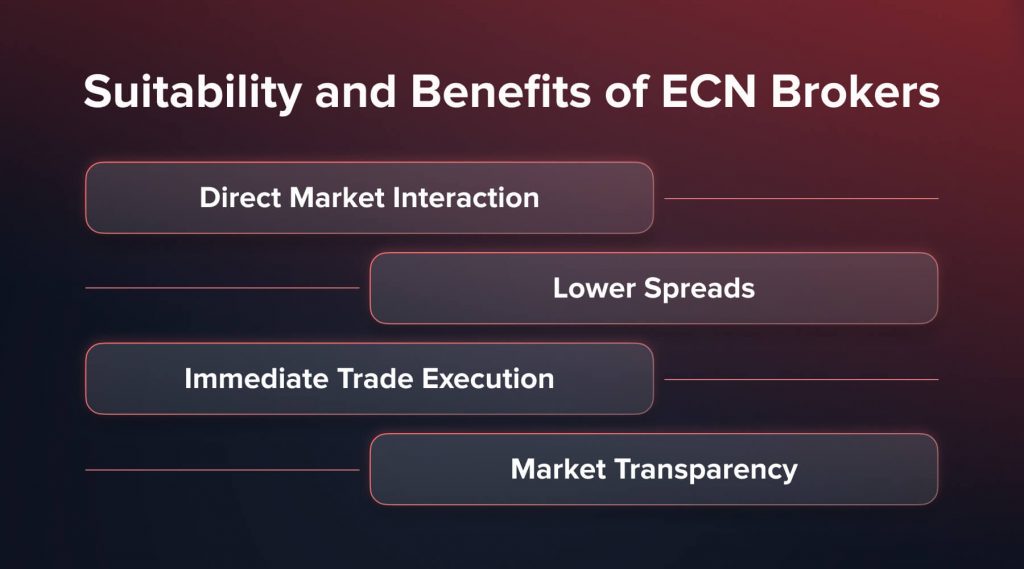
1. Direct Market Interaction:
Direct interaction between traders and brokerage companies with liquidity providers and other market players made possible by ECN brokers helps to drive more competitive prices and better market information.
2. Lower Spreads:
Due to the increased liquidity they provide, ECN brokers typically offer lower spreads, maximizing trading profitability by reducing transaction costs.
3. Immediate Trade Execution:
In the fast-paced forex market, traders must take advantage of market possibilities in real time, which ECN brokers enable via their high execution speeds.
4. Market Transparency:
Access to real-time order book data helps traders make more accurate assessments based on the whole picture of market circumstances provided by ECN brokers.
Challenges and Considerations with ECN Brokers
Although ECN brokers have many benefits, they can present certain difficulties mostly related to their complex operating mechanics and significant cost structures, which may be especially intimidating for beginning traders and smaller-scale investors. The challenges include:
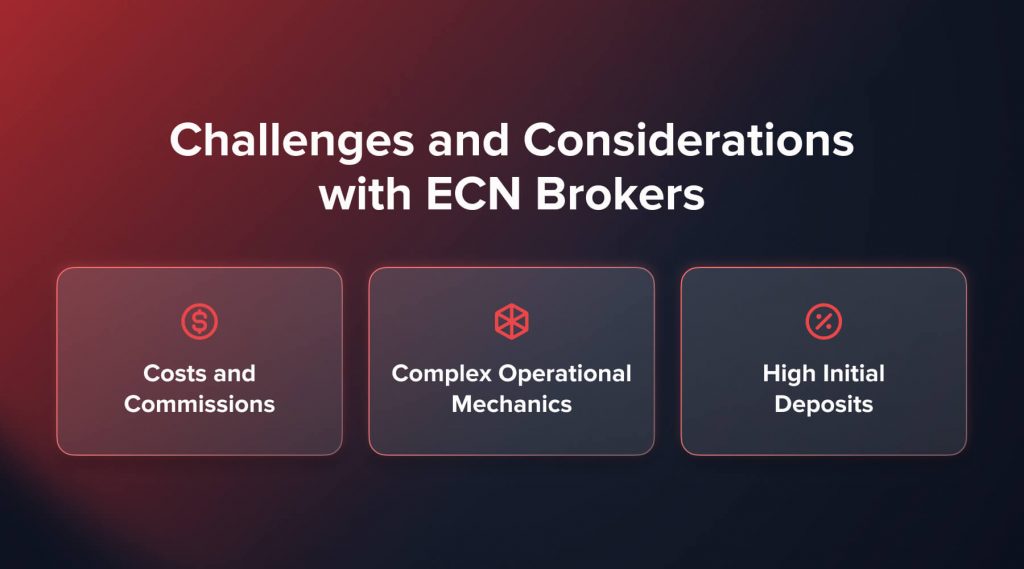
1. Costs and Commissions:
The fees and commissions associated with ECN brokers can be higher, posing a barrier for those with limited capital and potentially impacting overall trading profitability.
2. Complex Operational Mechanics:
For individuals who are unfamiliar with the complexity of the forex market, navigating the complicated operations of ECN brokers may be intimidating and call for a learning curve some would find difficult.
3. High Initial Deposits:
Some ECN brokers might demand large initial deposits, therefore excluding smaller traders and new brokerage companies from participating.
Transparency and Real-Time Updates
Unmatched transparency and the delivery of real-time information define ECN brokerage at its foundation. These tools let traders look at the orders and prices as they are, therefore guiding their choices depending on the current situation of the market. But along with this transparency comes the need of properly analyzing and interpreting the real-time data, which calls for a strong awareness of market dynamics and a sharp eye for detail.
Considerations
Aspiring brokers and traders must conduct a thorough assessment, juxtaposing the benefits against the inherent challenges and evaluating whether an ECN broker aligns with their trading strategies, financial capacity, and overall business objectives. A meticulous approach to understanding the operational dynamics, costs, and market interactions associated with ECN brokers is paramount to leveraging their advantages effectively and mitigating potential drawbacks.
STP Brokers Explained
STP (Straight Through Processing) brokers operate by transferring orders directly to the market, acting as conduits between traders and liquidity providers, offering a simpler, efficient pathway for trade execution. They are revered for their streamlined approach in facilitating trade processes, offering ease of use, and more simplified pricing structures.
STP brokers operate on a model that directly routes traders’ orders to the interbank market—where big banks trade. By doing so, they eliminate the need for a dealing desk and ensure no interference in order execution, allowing for a seamless trading experience.
Operational Dynamics
Direct Market Access
STP brokers enable traders to connect with the prevailing markets and liquidity in real time. This not only allows for faster transaction execution, but it also guarantees that traders can take advantage of ideal entry and exit positions, which are critical for limiting risks and maximising possible returns in the volatile forex market.
Pricing Structure
STP brokers often make their money via spreads, resulting in a more open and straightforward price structure. This cost transparency allows traders to better manage their trading budgets, resulting in a more accommodating trading environment in which hidden fees and commissions are not eating into profits.
Variable Spreads
The spreads in the STP model can vary, reflecting the real-time market conditions. This variability requires traders to stay adaptable and vigilant, especially during high market volatility, but also provides opportunities to capitalize on favorable market conditions when they arise.
Suitability and Benefits of STP Brokers
STP brokers cater to a broad spectrum of traders due to their balanced and straightforward approach. Their operational simplicity and relative cost-effectiveness make them a viable choice for those who find ECN models to be too complex and costly. The benefits are:
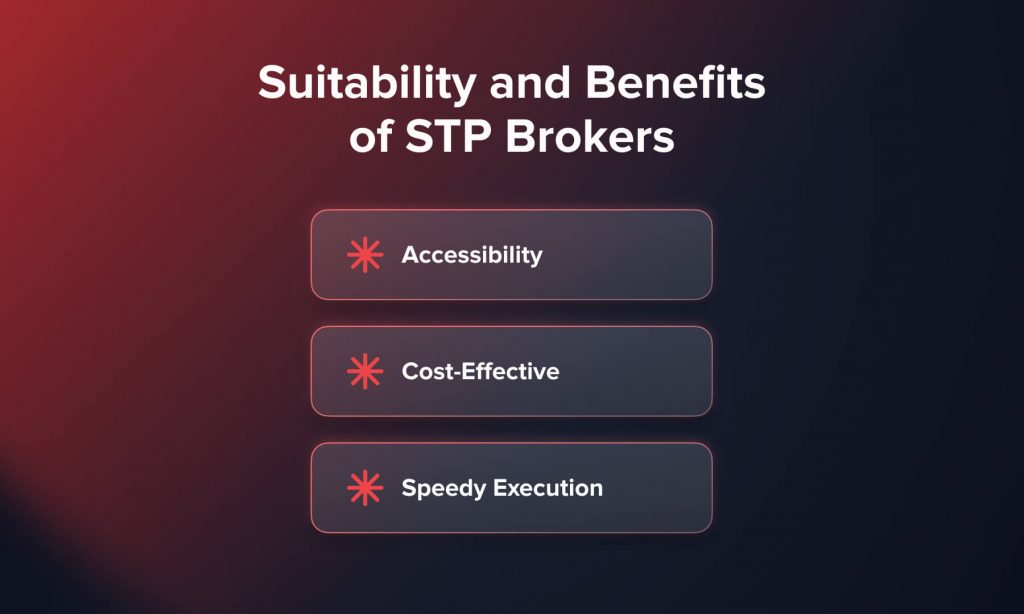
1. Accessibility
The operational simplicity of STP brokers means they are approachable to a wider audience, ranging from forex trading beginners to seasoned professionals. This accessibility broadens the opportunity for diverse trading strategies and styles, accommodating varying trading goals and risk tolerances.
2. Cost-Effective
STP brokers are an appealing choice for people with limited financial resources or who are risk-averse due to their higher predictability and cheaper fees. This cost-effectiveness enables traders to devote more resources to their trading activity, possibly improving their total performance.
3. Speedy Execution
By means of their efficiency and speed of trade execution in STP models, the lag between order placements and their fulfillment is reduced, thereby minimizing the dangers of price slippages and guaranteeing that traders can capitalize on market possibilities as they present themselves.
Challenges and Considerations with STP Brokers
While STP brokers do provide several advantages, potential users should be mindful of the inherent challenges, including fluctuating prices and the absence of guaranteed trades. Some of the challenges include:
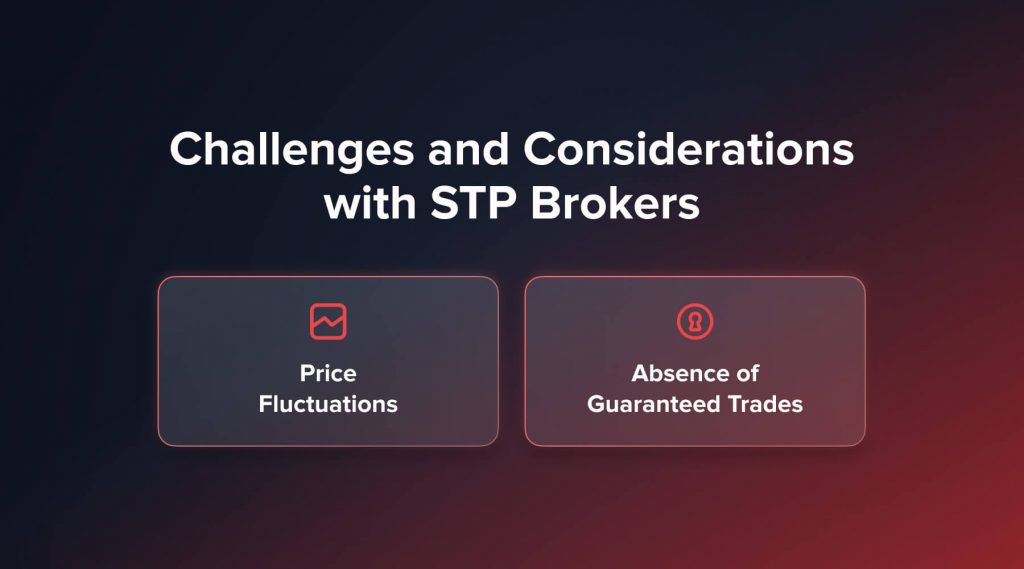
1. Price Fluctuations
Given the real-time nature of price adjustments in STP models, traders might experience significant price fluctuations, demanding continual market monitoring and swift decision-making to secure desired trade prices and manage potential risks effectively.
2. Absence of Guaranteed Trades
The non-guaranteed nature of trades means there’s a possibility of slippage; hence traders may not always secure the prices they anticipated when placing an order. Understanding and anticipating this aspect is crucial for developing effective risk management strategies and maintaining a balanced trading portfolio.
Considerations
Prospective users of STP brokers must first match their operational preferences, risk tolerance, and trading goals with the features and operational dynamics of STP brokers. Knowing the inherent difficulties and possible advantages will help traders and prospective brokers to maximize STP models, therefore improving their trading experience and results in the ever-changing forex market.
ECN vs. STP – Drawing Comparisons
When assessing ECN vs STP brokers, the core of the analysis transcends a simple comparison of their characteristics to identify which model would balance operational inclinations, risk tolerance, and trading goals. This is a strategic decision, like selecting the correct car that fits one’s particular requirement, driving style, and way of life.
Distinctive Trading Environments
ECN Brokers:
By building a complete trading environment, ECN brokers enable contact with many different market players. This creates a dynamic environment in which traders may see several market points of view, therefore improving their market knowledge and helping them to make informed decisions. But this contact comes with greater complexity and usually more expenses, hence strategies for trading and risk management must be more precise.
STP Brokers:
On the other hand, STP brokers route orders straight to the market without intermediaries, therefore providing a simpler trading environment. Those who want simple trade procedures and transparent pricing structures will find this environment less complicated and often more affordable. However, the simplicity of the STP model might not offer the same depth of market insight available in the ECN model.
Strategic Alignment
Choosing between ECN and STP brokers involves a strategic alignment of one’s trading goals, experience level, and preference for market interaction. Those who seek an immersive and intricate trading environment with extensive market insight might lean towards ECN brokers, while those who value simplicity and direct market access might find STP brokers more appealing.
Risk and Reward Dynamics
The intrinsic risk and reward dynamics in each model also play a pivotal role in this comparison. ECN brokers, with their elaborate market depth and interaction, might offer more opportunities for sophisticated trading strategies, potentially leading to higher rewards. These prospects, meantime, carry higher expenses and risks. Conversely, STP brokers may provide more consistent and less risky setting, but compared to ECN brokers, the chances for intricate strategies and large gains might be fewer.
Catering to Diverse Trader Profiles
ECN and STP brokers serve different types of traders and preferences. Because of its transparency and fast price changes, ECN is better suited for seasoned traders and those involved in high-frequency trading. For a range of traders from beginners to experts, STP is a more balanced choice as its simple approach and reduced complexity reflect their needs.
Final Thoughts
Prospective brokerage owners who want to launch their companies have to first learn the special operating strategies, benefits, and difficulties experienced by ECN and STP brokers. Finding which model fits your operational structure, client needs, and vision for your business is more crucial than arguing which one is the best. Through careful comparison of the intrinsic qualities of every model with your company goals and market positioning in mind, you may maximize operational efficiency and service delivery, thus improving the trading experience for your customers and so encouraging happiness and loyalty.
Atualizado:
18 de dezembro de 2024
12 de março de 2025
NEW POST FOR TESTING BLOG AND WP
What is Lorem Ipsum? test link with http Lorem Ipsum is simply dummy text of the printing and typesetting industry. Lorem Ipsum has been the industry’s standard dummy text ever since the 1500s, when an unknown printer took a galley of type and scrambled it to make a type specimen book. It has survived not only […]
